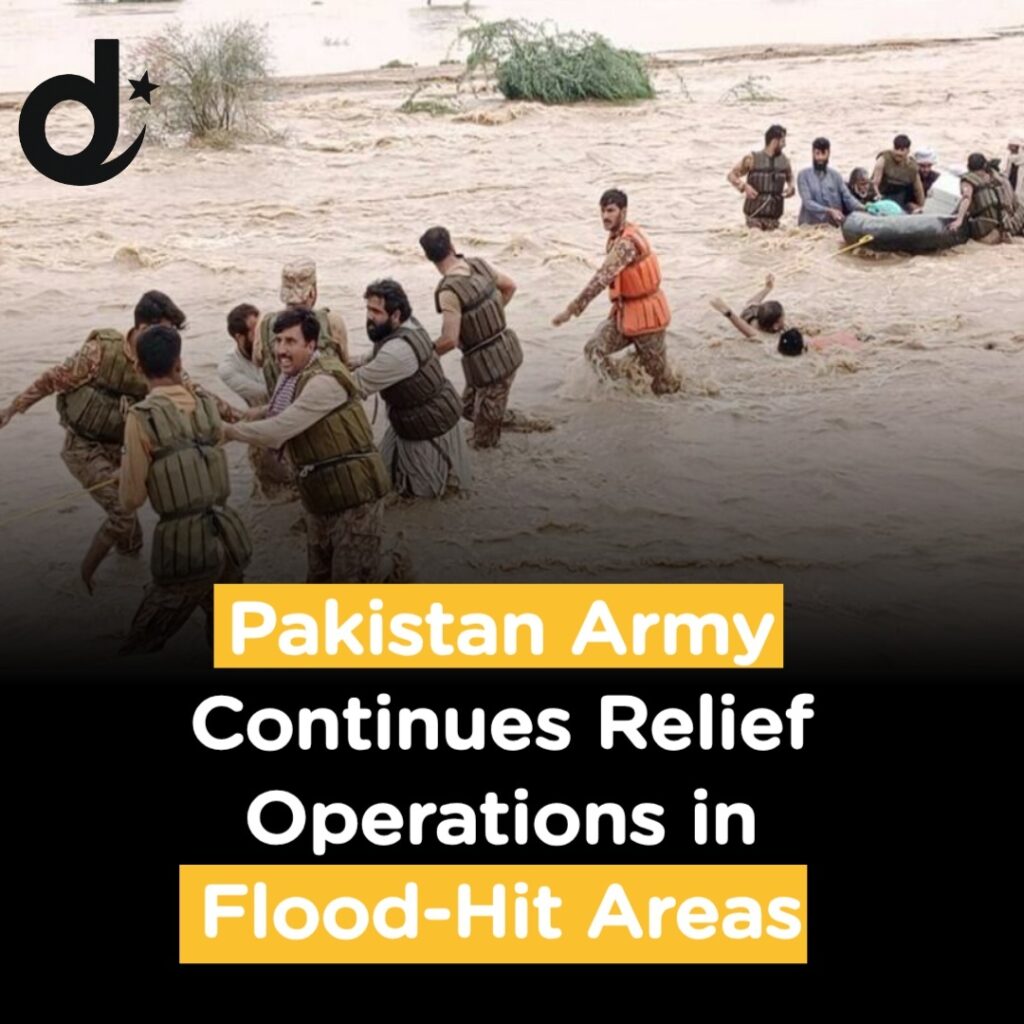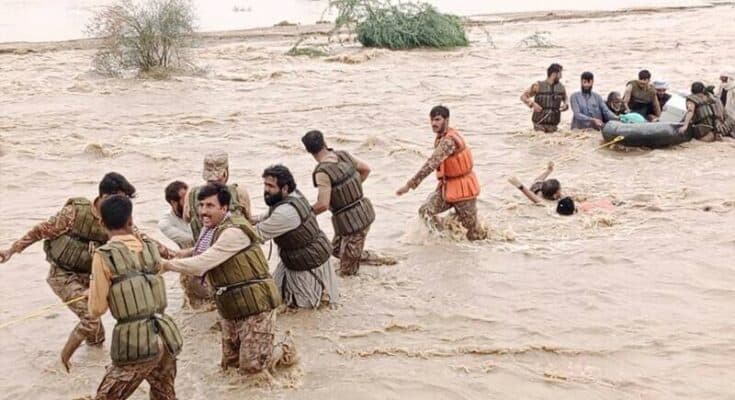
Pakistan Army Continues Relief Operations in Flood-Hit Areas
August 25, 2025
The Pakistan Army is steadfastly carrying out its relief operations in the flood-affected regions of the country. With the devastating floods causing significant damage across various provinces, the Army has quickly mobilized its resources to assist the displaced families and affected communities. Buner and Shangla, two districts heavily impacted by the floods, have become the focal points of these humanitarian efforts.
The floodwaters, which began wreaking havoc earlier this month, have left thousands stranded without access to basic necessities. The destruction of homes, roads, and bridges has compounded the difficulties for local residents, leaving them vulnerable to food shortages, medical emergencies, and a lack of shelter. In these trying times, the Pakistan Army has stepped in as a beacon of hope, working tirelessly to bring relief and comfort to the people in distress.
Immediate Response and Relief Distribution
In response to the widespread devastation, the Pakistan Army launched a well-coordinated relief mission, deploying its resources and personnel to the most affected areas. The relief teams have been actively engaged in distributing food, rations, clean drinking water, and other essential supplies. This distribution process has been carried out with precision to ensure that those in dire need receive assistance promptly.
In Buner, the Pakistan Army set up relief camps in various locations to facilitate the distribution of aid. The local communities, who were initially overwhelmed by the scale of the disaster, have expressed immense relief at the Army’s intervention. These relief camps provided not only food and clean water but also essential items such as tents, blankets, and hygiene kits, which were critical for the well-being of the displaced families.
The relief efforts in Shangla were similarly extensive. In addition to providing rations and medical supplies, the Army coordinated with local authorities and humanitarian organizations to ensure a continuous supply of relief items. The medical teams, led by trained Army doctors, set up field hospitals and mobile medical units to treat flood victims suffering from injuries, waterborne diseases, and other health complications.
Medical Assistance and Healthcare Services
The Pakistan Army’s medical teams have been instrumental in providing immediate healthcare to the flood victims. The teams, comprising skilled doctors, nurses, and paramedics, have set up temporary medical camps in the flood-affected areas to treat those in need of urgent medical attention. The mobile medical units have been traveling to remote and inaccessible areas, offering healthcare services to those who would otherwise have had no access to treatment.
Floods often bring with them a rise in waterborne diseases such as diarrhea, cholera, and malaria, which further exacerbate the suffering of the affected populations. The Army’s medical teams have been working diligently to prevent the spread of these diseases by providing proper treatment, distributing medicines, and educating local residents on how to protect themselves from health risks. In addition to dealing with waterborne diseases, the medical teams have also been offering first aid and treatment for injuries sustained during the floods, such as cuts, fractures, and bruises.
The Army’s efforts have been greatly appreciated by the local residents, who have expressed gratitude for the timely and effective medical intervention. Many of the flood victims have reported that without the Army’s presence, they would not have received the necessary medical care in such a short time.
Coordination with Local Authorities and Humanitarian Organizations
In addition to the direct relief operations, the Pakistan Army has been working closely with local authorities and humanitarian organizations to ensure a seamless and effective response to the crisis. This coordination has allowed for the efficient allocation of resources and the smooth delivery of aid to the affected regions. The Army has also been instrumental in providing security to relief teams and ensuring that the distribution of aid is carried out in an orderly manner, preventing any potential chaos or disruption.
Local government officials have been praising the Army’s dedication and professionalism in managing the relief efforts. The involvement of the Army has not only bolstered the overall response but has also provided a sense of security to the residents, who feel reassured by the presence of the military personnel.
One of the key aspects of the Army’s relief operations has been its emphasis on ensuring that no one is left behind. The flood-affected areas in Buner and Shangla are often difficult to access due to the damaged infrastructure, but the Army’s personnel have been determined to reach even the most remote villages. This commitment to inclusivity has helped many isolated communities receive much-needed support.
Local Residents’ Appreciation
The efforts of the Pakistan Army have not gone unnoticed, with local residents expressing their deep gratitude for the support they have received. Many flood victims have been overwhelmed by the Army’s unwavering commitment to helping them rebuild their lives in the aftermath of the disaster. Stories of Army personnel working around the clock, braving the harsh weather conditions, and putting the needs of the people first have emerged from the affected areas, further highlighting the dedication of the military in times of crisis.
One resident from Buner, who lost his home and belongings in the flood, expressed his heartfelt thanks to the Pakistan Army, saying, “We have seen the Army helping us in the most difficult of times. They have provided us with food, water, and medical care when we had nowhere to turn. We will never forget their kindness and support.”
In Shangla, a local woman who had been separated from her family during the floods shared her experience, saying, “The Army rescued me and my children from the floodwaters. They brought us to safety and gave us everything we needed. We are so grateful for their help. Without them, we would have been lost.”
These stories of appreciation and gratitude are a testament to the Army’s significant impact on the lives of those affected by the floods. The Army’s humanitarian efforts have not only provided immediate relief but have also brought hope and a sense of security to communities that were initially overwhelmed by the scale of the disaster.
Long-Term Commitment to Rebuilding
While the immediate relief operations are essential, the Pakistan Army is also focusing on long-term recovery and rebuilding efforts. As floodwaters recede and the extent of the damage becomes more apparent, the Army is preparing to assist in the reconstruction of homes, schools, and infrastructure. This long-term commitment is crucial in helping the affected communities recover and rebuild their lives in the aftermath of such a devastating event.
The Army’s involvement in the recovery process is expected to be comprehensive, encompassing not only the rebuilding of physical infrastructure but also providing emotional and psychological support to those who have experienced significant trauma. The Army’s engineering units are already in the process of assessing the damage to roads and bridges, with plans to restore connectivity to the affected areas as soon as possible.
Conclusion
The Pakistan Army’s ongoing relief operations in the flood-hit regions of Buner and Shangla are a testament to the strength, resilience, and dedication of the military in times of crisis. The relief teams, medical units, and local authorities have come together to provide vital support to those in need, helping them navigate the immediate aftermath of the floods and laying the groundwork for future recovery. The local residents’ appreciation of these efforts further highlights the Army’s positive impact on the affected communities.
As the relief operations continue, the Pakistan Army remains committed to ensuring that the people of Buner, Shangla, and other flood-affected regions receive the assistance they need, both in the short term and in the long-term process of rebuilding their lives.



